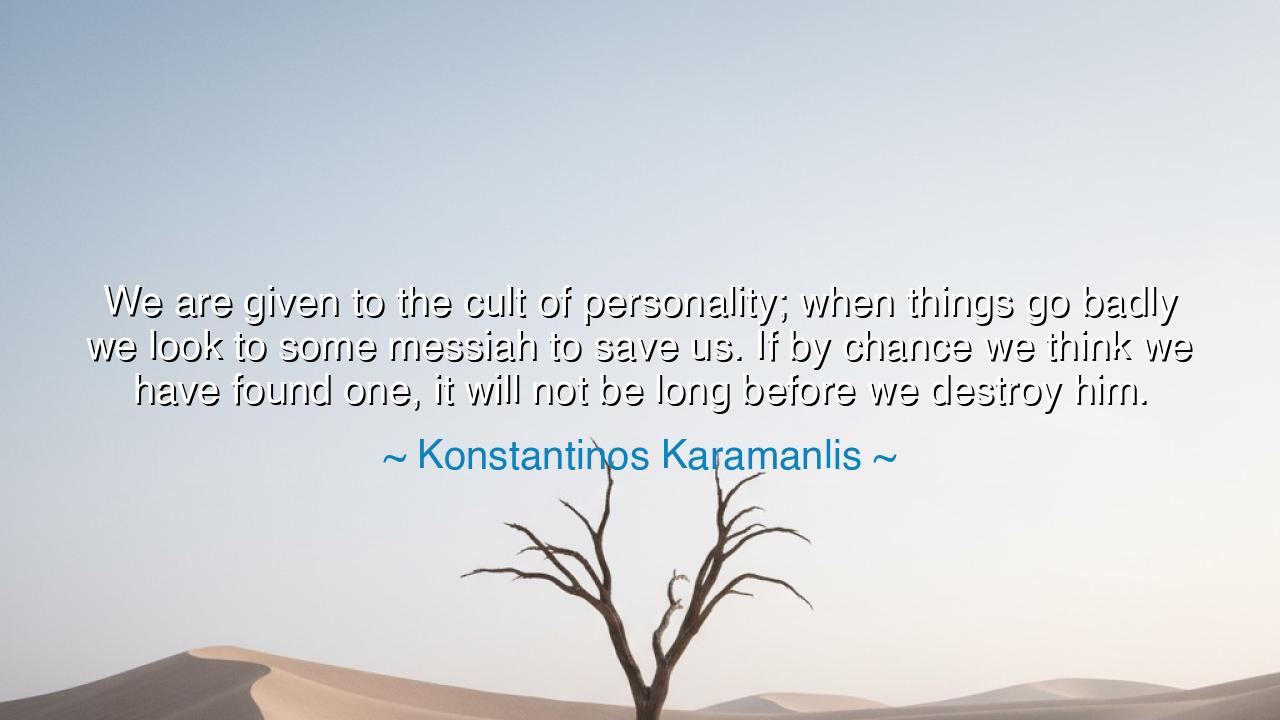
We are given to the cult of personality; when things go badly we
We are given to the cult of personality; when things go badly we look to some messiah to save us. If by chance we think we have found one, it will not be long before we destroy him.






In the vast unfolding of human history, few patterns are as predictable as the rise and fall of great leaders. The words of Konstantinos Karamanlis, “We are given to the cult of personality; when things go badly we look to some messiah to save us. If by chance we think we have found one, it will not be long before we destroy him,” speak with the weight of a truth that transcends time and geography. There is a deep flaw in the human condition, one that leads us to seek a savior in moments of crisis, and yet, as Karamanlis insightfully notes, we often destroy the very individuals we place upon pedestals. This cycle of idolization and destruction reveals a dangerous truth about our relationship with power, expectations, and the nature of true leadership.
In times of uncertainty, when the world seems to be in chaos and hope is scarce, humans are naturally inclined to seek out a figure — a messiah, a leader — who can restore order and deliver them from their struggles. This search for a savior is not a modern phenomenon, but one as old as the ancient world. Consider the rise of figures like Julius Caesar, whose leadership was seen as the key to Rome's survival in its darkest hours. People looked to him with hope, believing that his strong hand would bring peace and stability. Yet, as history shows, even the mightiest leaders are not immune to the human tendency to both elevate and undermine them. Caesar’s assassination by those he once trusted is a stark example of how a people can both worship and then destroy the very individual they relied upon.
Julius Caesar’s story reflects the broader human paradox: we place our faith in a leader, but we simultaneously burden them with expectations that are too great to bear. When they inevitably fall short — because no human can live up to the impossible standards we set — we turn on them, blaming them for our continued suffering. Napoleon Bonaparte provides another striking example. Initially hailed as a hero of the French Revolution, he rose to prominence, conquering much of Europe. But when his ambitions proved too much and his empire crumbled, the very people who once adored him turned their disillusionment upon him, leading to his eventual exile. Karamanlis' words echo this cycle of rise and fall, reminding us that our need for a messiah is often driven by impatience and unrealistic expectations.
This cycle of idolization and destruction also touches upon a more personal and societal dynamic: our inability to accept the imperfections of those we look up to. It is an ancient truth that leaders, like all humans, are flawed, and yet, in our search for a savior, we fail to see them as complex individuals. Instead, we create an image of them that is often more about our own desires than about who they truly are. Alexander the Great, for example, was seen by many as a god-like figure during his conquests. Yet, as his empire faltered and his decisions grew more erratic, his soldiers and companions began to question his authority, culminating in growing dissent and the eventual fragmentation of his empire after his death.
The true lesson in Karamanlis' words lies not only in the patterns of human nature but in how we view leadership. True leadership is not about perfection or about expecting someone to bear the weight of all our hopes. Leaders, like all individuals, will face moments of failure, doubt, and imperfection. True greatness lies not in meeting every expectation placed upon them, but in their ability to adapt, to accept their flaws, and to inspire others to rise with them, not just to look to them for salvation. Great leaders, in this sense, are those who recognize that the responsibility of leadership is shared by all, and that success is the result of collective effort, not the individual perfection of the leader alone.
In our own lives, the lesson is to release the cult of personality and to understand that no single person can be the answer to all our problems. When we face challenges, whether in our personal lives, in our communities, or in the larger world, it is essential to understand that leadership is not about finding a messiah but about coming together, about collective effort, and about accepting the imperfections in ourselves and those who lead us. Expectations must be realistic, and we must learn to support those who rise to positions of leadership without expecting them to be flawless or to solve every problem on their own.
So, as Karamanlis so wisely teaches us, let us break free from the cycle of elevating others to unreachable heights, only to tear them down when they inevitably fall short. Instead, let us empower leaders by embracing collaboration and shared responsibility, and by recognizing that true strength lies not in perfection, but in growth, adaptability, and the collective spirit of those who strive together. When we abandon the search for a perfect savior and instead turn to each other for support, we find that the true power of leadership is not in the individual, but in the unity and strength of the many.






AAdministratorAdministrator
Welcome, honored guests. Please leave a comment, we will respond soon